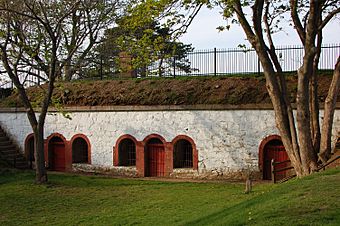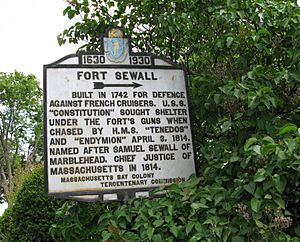Fort Sewall facts for kids
|
Fort Sewall
|
|
|
U.S. Historic district
Contributing property |
|

Fort Sewall bombproof
|
|
| Location | Marblehead, Massachusetts |
|---|---|
| Built | 1634 |
| Part of | Marblehead Historic District (ID84002402) |
| NRHP reference No. | 75001908 |
Quick facts for kids Significant dates |
|
| Added to NRHP | April 14, 1975 |
| Designated CP | January 10, 1984 |
Fort Sewall is a very old and important fort in Marblehead, Massachusetts. It sits on a point of land called Gale's Head. This spot looks out over the entrance to Marblehead Harbor. For a long time, until 1814, it was known as Gale's Head Fort. This fort was built to protect the coast from attacks by sea.
Contents
Fort Sewall's Long History
How Old Is Fort Sewall?
Gale's Head was first made into a fort way back in 1634. This makes it one of the oldest English forts on the coast of the United States. A stronger fort was built there in 1742 during a war called King George's War. It continued to be used through the French and Indian War.
Fort Sewall During the American Revolution
The fort was rebuilt in 1775 when the American Revolutionary War began. Soldiers from the Marblehead Regiment, led by Colonel John Glover, guarded it in 1775 and 1776. This shows how important the fort was for protecting the area during the fight for independence.
After the American Revolution, the United States government took over the fort. They improved it as part of a plan to strengthen the nation's defenses. This plan was known as the First System of U.S. fortifications. A special building called a blockhouse was added in 1794. More rebuilding happened in 1799. Some of the storage areas for gunpowder from these times are still there today.
The fort was rebuilt again in 1809. It was given eight large guns as part of the Second System of defenses. By 1811, the fort was described as a strong stone and earth structure. It had eight heavy cannons and was protected by a blockhouse.
Fort Sewall and the War of 1812
One of the most famous stories about Fort Sewall happened during the War of 1812. On April 3, 1814, a famous American ship, the USS Constitution, also known as "Old Ironsides," was chased by two British ships. These were the HMS Tenedos and HMS Endymion. The Constitution found safety under the guns of Fort Sewall.
The fort's soldiers didn't have enough ammunition or gunpowder to actually fight the British ships. But they were very clever! They pretended to be ready for a big fight. They moved all their cannons into position, making it look like they were about to attack. The British ships saw this and thought the fort was fully prepared. Not wanting to face both a powerful American warship and a strong fort, the British decided to leave. They never knew it was a trick!
In 1814, the fort was renamed Fort Sewall. It was named after Samuel Sewall. He was a very important judge who led the Massachusetts Supreme Court until he passed away in 1814.
Fort Sewall During the Civil War
After the War of 1812, the fort slowly fell apart. But during the Civil War, it was used again. Soldiers from the Massachusetts militia were stationed there. The fort was rebuilt to defend Marblehead Harbor, and 12 cannons were placed there. Some Confederate prisoners of war were even held at the fort.
By 1864, the fort was almost twice its original size. A special bombproof shelter was added to protect soldiers from explosions. By early 1865, the fort had several powerful cannons, including smoothbore and rifled guns.
Fort Sewall's Last Military Use
After the Civil War, Fort Sewall was no longer considered necessary for coastal defense. Its last military use was during the Spanish–American War in 1898. It was used as a place for soldiers to gather before going off to fight.
Fort Sewall Today
In 1892, the town of Marblehead decided to make the fort a town park. However, the federal government took control of it again during the Spanish-American War. Finally, in 1922, the fort was given back to the town. Today, Fort Sewall is a public park that everyone can visit. It was added to the National Register of Historic Places in 1975, recognizing its important history.
Images for kids
 | Selma Burke |
 | Pauline Powell Burns |
 | Frederick J. Brown |
 | Robert Blackburn |





